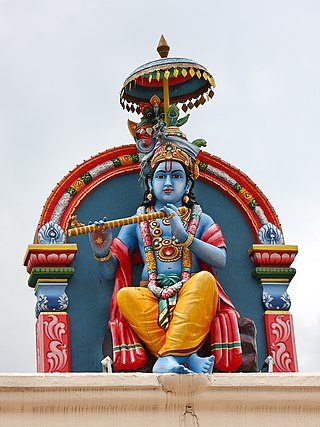
Krishna is a major deity in Hinduism. He is worshipped as the eighth avatar of Vishnu and also as the Supreme God in his own right. He is the god of protection, compassion, tenderness, and love; and is widely revered among Hindu divinities. Krishna's birthday is celebrated every year by Hindus on Krishna Janmashtami according to the lunisolar Hindu calendar, which falls in late August or early September of the Gregorian calendar.
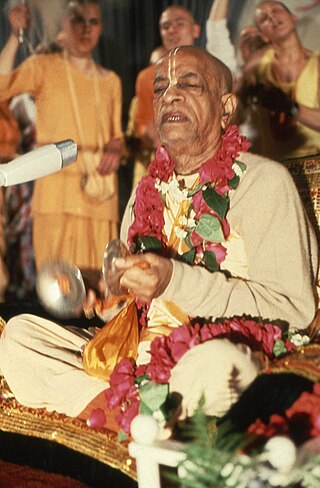
A. C. Bhaktivedanta Swami Prabhupada was a spiritual, philosophical, and religious teacher from India who spread the Hare Krishna mantra and the teachings of "Krishna consciousness" to the world. Born as Abhay Charan De and later legally named Abhay Charanaravinda Bhaktivedanta Swami, he is often referred to as "Bhaktivedanta Swami", "Srila Prabhupada", or simply "Prabhupada".

International Society for Krishna Consciousness (ISKCON), known colloquially as the Hare Krishna movement, is a Gaudiya Vaishnava Hindu religious organization. It was founded on 13 July 1966 in New York City by A. C. Bhaktivedanta Swami Prabhupada. Its main headquarter is located in Mayapur, West Bengal, India. It claims around 1 million members worldwide.

Vijayadashami, more commonly known as Dassahra in Hindi-Urdu, and also known as Dashāhra or Dashain in Maithili and Nepali, is a major Hindu festival celebrated every year at the end of Durga Puja and Navarahtri. It is observed on the tenth day of the month of Ashvin, the seventh in the Hindu lunisolar calendar. The festival typically falls in the Gregorian calendar months of September and October,more specifically between 27 September and 26 October.It is celebrated on the tenth day of the waxing moon(Shukla Paksha) of the Ashvayuja month

Hinduism has been spread in Russia primarily due to the work of scholars from the religious organization International Society for Krishna Consciousness (ISKCON) and by itinerant Swamis from India and small communities of Indian immigrants. While ISKCON appears to have a relatively strong following in Russia, the other organizations in the list have a marginal presence in this country. There is an active Tantra Sangha operating in Russia. According to the 2012 official census, there are 140,010 Hindus in Russia, which accounts for 0.1% of the population of Russia.
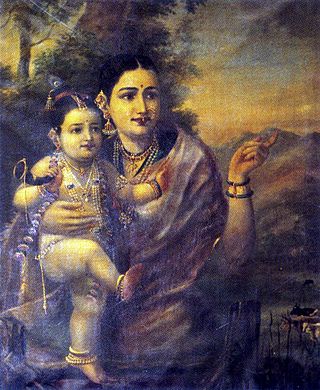
Krishna Janmashtami, also known simply as Krishnashtami, Janmashtami, or Gokulashtami, is an annual Hindu festival that celebrates the birth of Krishna, the eighth avatar of Vishnu. In certain Hindu texts, such as the Gita Govinda, Krishna has been identified as supreme God and the source of all avatars. Krishna's birth is celebrated and observed on the eighth day (Ashtami) of the dark fortnight in Shravana Masa. According to the purnimanta tradition), Krishna's birth is celebrated on the eighth day (Ashtami) of the dark fortnight in Bhadrapada Masa.

Vrindavan, also spelt Vrindaban and Brindaban, is a historical city in the Mathura district of Uttar Pradesh, India. It is located in the Braj Bhoomi region and holds religious importance for Hindus who believe that Krishna, one of the main Gods in Hinduism, spent most of his childhood in this city. Vrindavan has about 5,500 temples dedicated to the worship of Krishna and his chief consort, Radha. It is one of the most sacred places for Vaishnava traditions.

Bochasanwasi Akshar Purushottam Swaminarayan Sanstha is a Hindu denomination within the Swaminarayan Sampradaya. It was formed in 1905 by Shastri Yagnapurushdas following his conviction that Swaminarayan remained present on earth through a lineage of gurus starting with Gunatitanand Swami. As of August 2016, Mahant Swami Maharaj is the 6th guru and president of BAPS.
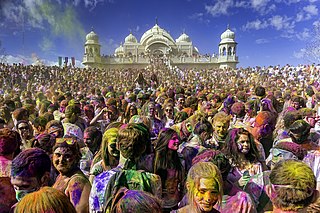
Hinduism is the fourth-largest religion in the United States, comprising 1% of the population, nearly the same as Buddhism and Islam. The majority of American Hindus are immigrants, mainly from India, Nepal, Sri Lanka, Bangladesh, and the Caribbean, with a minority from Bhutan, Pakistan, Afghanistan, Canada, Africa, Europe, Oceania, and other countries.

Swaminarayan, also known as Sahajanand Swami, was a yogi and ascetic believed by followers to be a manifestation of Krishna or the highest manifestation of Purushottama, around whom the Swaminarayan Sampradaya developed.

Hinduism is a minority religion practised by 0.6% of the population of Switzerland. Approximately 90% of Hindu adherents are foreign-born, and about a third of them have the status of refugee or asylum seeker. The Sri Sivasubramaniar Temple, located in the Sihl Valley in Adliswil, is the most famous and oldest Hindu temple in Switzerland, the Arulmihu Sivan Temple located in Glattbrugg is dedicated to Shiva, and the latest foundation is the Sri Vishnu Thurkkai Amman Temple in Dürnten in 2010.

Hinduism was first introduced by Sindhi settlers who migrated to Ghana after India was divided in 1947. It was spread to Ghana actively by Ghana's Hindu Monastery headed by Swami Ghananand Saraswati and by the International Society for Krishna Consciousness (ISKCON). Hinduism is one of the fastest growing religions in Ghana.
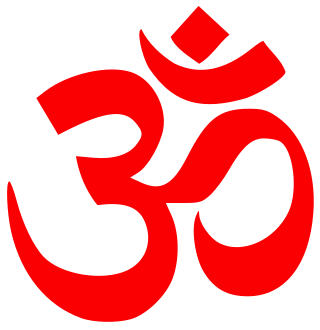
Hinduism is a minority religion in Hungary. According to the 2022 census, there were 3,307 Hindus in Hungary.

Shri Swaminarayan Mandir, Junagadh, also called ShriRadha Ramana Temple, Junagadh is a Hindu temple in Junagadh, Gujarat, India. This temple was ordered to be built by Swaminarayan himself, the founder of the Swaminarayan Sampradaya.

BAPS Shri Swaminarayan Mandir is a Hindu temple in Toronto, Ontario, that was built by the BAPS Swaminarayan Sanstha. The BAPS Swaminarayan Sanstha, which is headed by Mahant Swami Maharaj, is a global spiritual organization within the Swaminarayan branch of Hinduism. The mandir was built in 18 months and consists of 24,000 pieces of hand-carved Italian carrara marble, Turkish limestone and Indian pink stone. The mandir is the largest of its kind in Canada and was constructed according to guidelines outlined in ancient Hindu scriptures. The grounds spread over 7.3 hectares and in addition to the mandir, include a haveli and the Heritage Museum. The mandir is open daily to visitors and for worship. On June 26, 2023, the temple celebrated its 16-year anniversary.

The Swaminarayan Sampradaya, also known as Swaminarayan Hinduism and Swaminarayan movement, is a Hindu Vaishnava sampradaya rooted in Ramanuja's Vishishtadvaita, characterized by the worship of its charismatic founder Sahajanand Swami, better known as Swaminarayan (1781–1830), as an avatar of Krishna or as the highest manifestation of Purushottam, the supreme God. According to the tradition's lore, both the religious group and Sahajanand Swami became known as Swaminarayan after the Swaminarayan mantra, which is a compound of two Sanskrit words, swami and Narayan.

The Shri Swami Narayan Mandir, Karachi is a Hindu temple that is the only Swami Narayan temple in Pakistan. The temple is notable for its size and frontage, over 32,306 square yards (27,012 m2) on the M. A. Jinnah Road in Karachi city. The temple celebrated its anniversary of 216 years in April 2004. There is a sacred cowshed within the premises of this temple. The temple is located at the centre of a Hindu neighbourhood in Karachi. The building that housed a dharmshala for visiting devotees has now been converted to the office of the City District Government.
The reception of Hinduism in the Western world began in the 19th century, at first at an academic level of religious studies and antiquarian interest in Sanskrit.
Hinduism in Los Angeles made its first significant impact in the late 19th century when wandering Hindu monk Swami Vivekananda, a disciple of Ramakrishna Paramahamsa, came on his second visit to the United States. Swami Paramananda, a disciple of Swami Vivekananda, founded the Vedanta centres in Los Angeles and Boston.


















